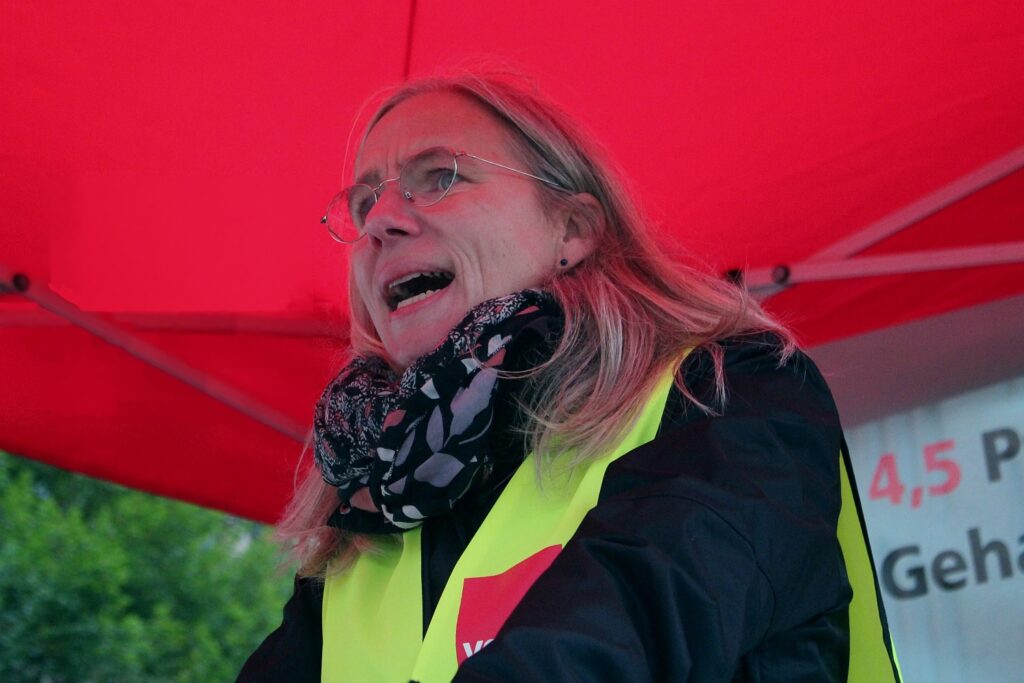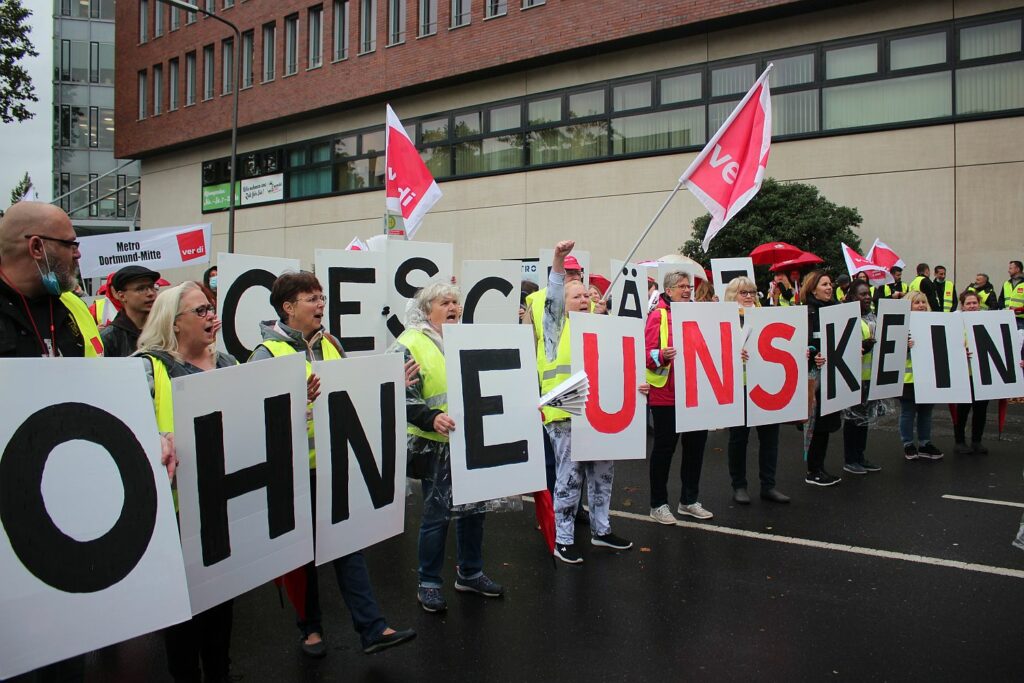The ver.di members unceremoniously turned Schlüterstrasse in Düsseldorf Flingern-Nord into a dead end on Wednesday morning (October 6th) and set up a small stage in the middle of the street. With songs by Gunter Gabriel “Hey Boss, I need more money” or by the Fantastischen Vier “Together”, the striking metro workers from eight locations got in the mood for their strike rally. Over 100 strikers had come as delegations in front of the Metro headquarters in order to send a clear signal before the next round of wage negotiations on Monday (October 11th). They demanded a 4.5 percent wage increase and 45 euros more salary.
Delegations from the Metro locations in Neuss, Dortmund, Düsseldorf, Essen, Recklinghausen, Wuppertal, Leverkusen and Würselen had moved in front of the Metro headquarters
–
The ver.di tariff commission has been negotiating with Metro since May – so far without an agreement. An appointment was even canceled by the employer, reported a member of the negotiating commission on Wednesday indignantly on the microphone, because “an agreement is unlikely”. One has the impression that the Metro wants to buy time to get another zero months out, she criticized to the applause of the strikers.
The employers’ association has recommended to its collective bargaining member companies a unilateral increase of 2 percent by December 1, 2021. Ver.di negotiator Silke Zimmer explains: “Our colleagues have been waiting for their achievements to be recognized for over five months. During the pandemic, the Metro employees also ensured that the population was supplied with everything they need because of the opening of the markets to private individuals. They strike because they are disappointed and angry with the refusal of their employers. Despite increases in sales in times of rising inflation, they want to prescribe real wage waivers. We will not go along this path of walling! “The message to the Metro, which is sitting at the negotiating table, is clear from the union’s point of view:” The time game must come to an end. A tariff result was achieved in Bavaria on Monday. This must also be the guideline for North Rhine-Westphalia, ”said Zimmer.

ver.di negotiator Silke Zimmer
–
The Bavarian wage result provides for a two-stage wage increase. Plus three percent on October 1, 2021 and a further 1.7 percent on April 1, 2022 with a term of 24 months. This year, trainees will receive 30 euros more and 2022 more. The NRW tariff commission will meet on Thursday to evaluate the Bavarian result.
Silke Zimmer explains that from 2010 to 2019 the proportion of wholesale and foreign trade companies with collective bargaining coverage fell by 14 percent from 48 to 34. For around 47,000 employees, this means the loss of protection through a collective agreement. The example of Real showed the tricks companies use to get rid of collective bargaining coverage. The trade unionist vehemently demanded that politicians finally intervene in order to stop the flight from collective bargaining. The ban on plastic bags and the commitment to animal welfare showed that things can be achieved that one would not have thought possible. This is how it should go with wage dumping.

“No business without us” and “no work without value” chanted the strikers on Wednesday
–
The previous employer offer does not provide for a salary increase in the table for 2021, only a one-off payment of 150 euros in July 2021 for economically healthy companies. In January 2022, all employees are to receive 150 euros one-off payment (corona premium). According to the employer’s offer, a percentage increase of 1.5 percent will not be agreed until July 2022. Companies that have received short-time work benefits, bridging allowances or other state support benefits for at least three months in the period from January 2021 to June 2022 can even postpone the percentage wage increase by 6 months until January 1, 2023 at the latest.
ver.di is demanding 4.5 percent and 45 euros more salary, wages and training allowances for around 336,000 employees in the wholesale and foreign trade in North Rhine-Westphalia, with a term of 12 months. In addition, the union demands that employers jointly apply for the general application of collective agreements.
–


